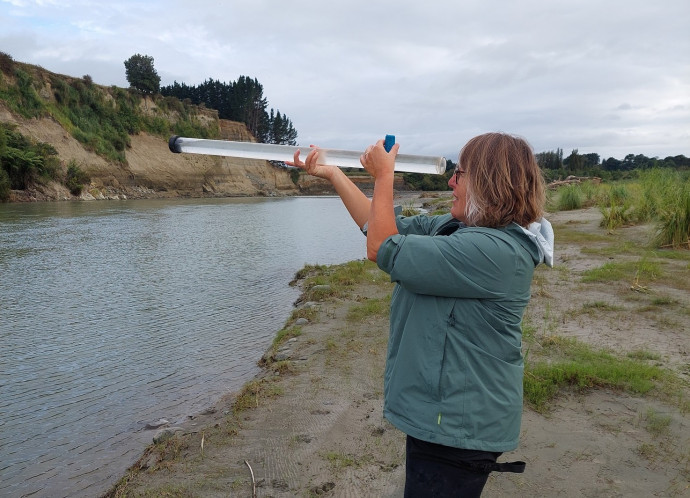Winchester School Te Kura O Te Haonui - Jolanda Hanly

2023 | How Environmental Science Informs Regional Policy and Regulations.
Name: Jolanda Hanly
School: Winchester School Te Kura O Te Haonui
Region: Palmerston North, Manawatū
Host: Horizons Regional Council
Placement: How Environmental Science Informs Regional Policy and Regulations
Winchester School Te Kura O Te Haonui believes that great science teaching can foster a love of learning through meaningful and engaging experiences. Empowering students to take ownership over their learning is important to the school as well as giving their students plenty of opportunities to develop a passion for science to help inspire them to be our next generation of scientists and leaders. Having a teacher develop science leadership skills will also bring greater depth and practical understanding of the Nature of Science and create many opportunities that align with the uara (values) of our learning community.
Jolanda has gained a good understanding of the pivotal role that the principles underlying the Nature of Science play in policy making at Horizons Regional Council. The Science and Policy team at Horizons Regional Council serves as a guiding force for evidence-based decision making, ensuring that policies and actions are grounded in reliable data and research. By integrating scientific insights the council can develop well-informed policies that effectively contribute to the long-term well-being of the region and its inhabitants.
Jolanda has learned how the following aspects of the Nature of Science influences policy making:
Understanding Science:
- Science provides reliable information for evidence-based decision making.
- Informed decisions based on scientific knowledge can have a positive impact on the environment.
- Science enhances the credibility and transparency of policy-making proce sses.
- It helps policymakers gain a deeper understanding of the intricate ecosystems and valuable resources.
Investigating Science:
- Science conducts thorough evaluations of the effects of policies and actions.
- It weighs the advantages and disadvantages of different approaches to policy-making.
- Science supports the development of policies that prioritise the protection of nature and resources.
- It ensures that policies are grounded in scientific evidence and informed analysis.
Communicating in Science:
- Science promotes collaboration and engagement with experts and stakeholders.
- By sharing knowledge and expertise, better outcomes can be achieved.
- Collaboration breaks down barriers and fosters the pursuit of common goals.
- Access to research and technological advancements is facilitated through scientific collaboration.
Participating and Contributing in Science:
- Active participation in scientific processes provides firsthand experience and insights.
- Policymakers can make better decisions by learning from scientific research and findings.
- Science promotes innovation by fostering a culture of curiosity, exploration, and problem-solving.
Fieldwork emerges as a significant aspect of policy making at Horizons Regional Council, serving as the foundation for policy development. Throughout Phase One, Jolanda has actively participated in various fieldwork and sampling activities, collecting crucial data and information about the environment.
One of Jolanda's key involvements has been in water quality sampling. This task entails collecting water samples from rivers and streams, enabling the council to assess important parameters such as temperature, pH, dissolved oxygen, nutrient levels, turbidity, and contaminant concentrations. Through water quality sampling, Jolanda has contributed to the monitoring and management of aquatic ecosystems.
Additionally, Jolanda has been engaged in river and stream ecological monitoring. This involves sampling and identifying invertebrates and macrophytes (aquatic plants) present in waterways. By studying these organisms, Jolanda has gained valuable insights into the ecological health and diversity of rivers and streams, which further informs the council's policies and management strategies.
Jolanda's placement with the Science Team at Horizons Regional Council has been a transformative and deeply appreciated experience. Throughout her time there, she has grown significantly as a science teacher, gaining a profound understanding of the Nature of Science and its vital role in evidence-based decision-making, particularly in shaping policies that positively impact the environment.
The Royal Society's numerous opportunities for professional development have been instrumental in Jolanda's growth. Through workshops, collaborative projects, and engagements with experts, she has honed her skills in investigating science, effective communication, and active participation in scientific processes. This exposure has ignited her passion for problem-solving, fostering a culture of curiosity and innovation.
With a newfound appreciation for the collaborative nature of science, Jolanda will use her experiences and knowledge to develop a dynamic science program at Winchester School. Jolanda's commitment to fostering a culture of curiosity and exploration will inspire her students to become enthusiastic learners and thoughtful contributors to the scientific community and society as a whole.
As she looks forward to this new chapter, she is grateful for the invaluable experiences and opportunities that have shaped her growth as an educator and a champion of science education.
